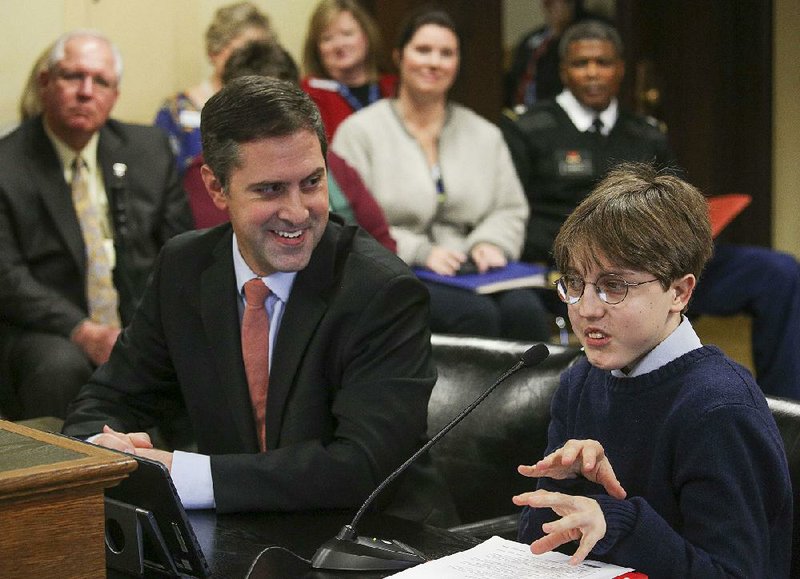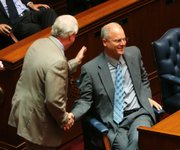Gov. Asa Hutchinson's legislation to cut individual income-tax rates for Arkansans with taxable incomes below $21,000 sailed through the Senate Revenue and Taxation Committee on Wednesday.
RELATED ARTICLES
http://www.arkansas…">Legislators slam brakes on lottery's ad contracthttp://www.arkansas…">State Capitol briefs http://www.arkansas…">Calendar
In a voice vote with no audible dissenters, the eight-member committee sent Senate Bill 115 by Senate Republican leader Jim Hendren of Sulphur Springs to the Senate for further consideration. The amended bill approved by the committee has 15 Republican senators and three Democrats as co-sponsors. Hendren said he expects the 35-member Senate to consider the bill Monday.
SB115 would become effective for tax years starting on or after Jan. 1, 2019. It's projected to reduce state general revenue by $25.25 million in fiscal 2019, which starts July 1, 2018, and $50.5 million each year thereafter, according to the state Department of Finance and Administration.
After the Senate tax committee endorsed the bill, Hutchinson said "the quick approval of the tax cut by the Senate tax committee reflects the broad support in the General Assembly of the tax plan."
Some lawmakers had been reluctant to commit to Hutchinson's plan because sales-tax revenue has lagged behind the state's forecast in the first six months of fiscal 2017, which started July 1.
Hendren said the proposed tax cut in his bill is conservative.
Sen. Bruce Maloch, D-Magnolia, asked Hendren if "you agree the conservative thing to do would be to wait later in the session until we saw a little more revenue before we actually voted on it."
Hendren said he disagreed.
Businesses "determine how much money you got, and then you determine what you are going to spend," he said. "I actually like the precedent of trying to set tax policy on the front end of the session."
The Republican governor has proposed a general-revenue budget of $4.48 billion for fiscal 2018, starting July 1 -- a $153 million increase over fiscal 2017 with most of the additional money going to the state Department of Human Services.
Hendren later told reporters that he's "absolutely" comfortable that the state can afford his legislation.
"I would be a little bit hesitant if this took effect immediately ... at the end of this fiscal year. We have got an entire fiscal session [in 2018] if we needed to adjust because revenue reports lagged," he said.
"This gives something to build on. It gives us a process. We all hope for the best and plan for the worst, so ... I believe Arkansas is continuing to grow and create jobs and we will be able to continue down this path," Hendren said.
Others lawmakers have favored larger income tax cuts, particularly for Arkansans with taxable incomes of more than $75,000. To placate those lawmakers, the bill also would create a 16-member Arkansas Tax Reform and Relief Legislative Task Force to recommend further tax cuts. The task force would be required to file its final written report with the governor, House speaker and Senate president pro tempore on or before Sept. 1, 2018.
Meanwhile, House Revenue and Taxation Committee Chairman Joe Jett, R-Success, said the House tax committee today will consider House Republican leader Mat Pitsch's House Bill 1159, which is identical to SB115, and Democratic Rep. Warwick Sabin's House Bill 1161 to create a state earned income tax credit.
"My gut feeling is both of them have to good chance to come out [of committee]," Jett said.
The House committee comprises 10 Republicans and 10 Democrats, while the House has 76 Republicans and 24 Democrats.
For Arkansans with taxable income of less than $21,000 a year, SB115 and HB1159 both would reduce the individual income tax rate from 0.9 percent to zero percent for taxable income between zero and $4,299; from 2.4 percent to 2 percent for taxable income from $4,300 to $8,399; from 3.4 percent to 3 percent for taxable income between $8,400 and $12,599; and from 4.4 percent to 3.4 percent for taxable income between $12,600 and $20,999.
Hendren said these provisions would reduce individual income taxes for about 657,000 Arkansans, including 120,000 people in the lowest tax bracket who will no longer pay state income taxes. The largest tax cut a single taxpayer could receive is $156 and a married couple could receive a $312 tax cut, the finance department said.
For Arkansans with taxable income between $21,000 and $75,000, the bills would reduce the individual income tax rate from 0.9 percent to 0.75 percent for taxable income between zero and $4,299. That provision is designed to alleviate the "cliff" effect that occurs when an increase in a taxpayer's income causes a shift to the middle income tax table, the finance department said.
Sabin's HB1161 would create a state earned income tax credit equal to 5 percent of the federal earned income tax credit for tax years starting on or after Jan. 1, 2017. The bill is projected to reduce state general revenue by $40 million in fiscal 2018, according to the finance department.
Hendren said he expects the Senate tax committee next week to consider legislation exempting military retirement benefits from state income taxes, coming to about $13 million a year, as part of a $19 million-a-year plan to cut two taxes and modify three tax exemptions. The bill is Senate Bill 120 by Sen. Jane English, R-North Little Rock. House Bill 1162 by Rep. Charlene Fite, R-Van Buren, is an identical bill in the House Revenue and Taxation Committee.
Most of the Senate tax committee members have said they don't like Hutchinson's proposal to apply the sales tax to the full cost of manufactured housing, which is now taxed at 62 percent of a mobile home's value, to raise a projected $2.5 million to help finance the exemption for military retirement benefits.
Senate Revenue and Taxation Committee Chairman Jake Files, R-Fort Smith, said an option to changing the sales-tax exemption for mobile homes would be to end the sales-tax exemption on digital products and computer software delivered electronically
"There is a [sales-tax exemption] for digital downloads and, if you walk into Wal-Mart or whenever and buy computer software ... or a CD, you pay tax there," he said. "[But] if you download that on the Internet, you do not, so it is a matter of fairness."
A Section on 01/19/2017


